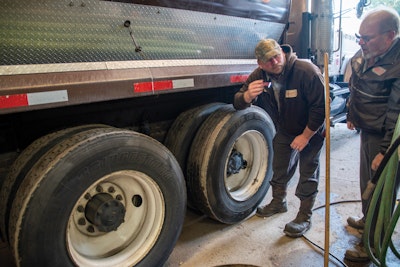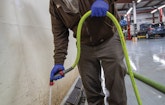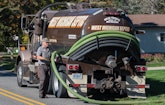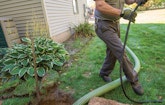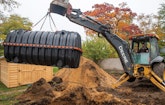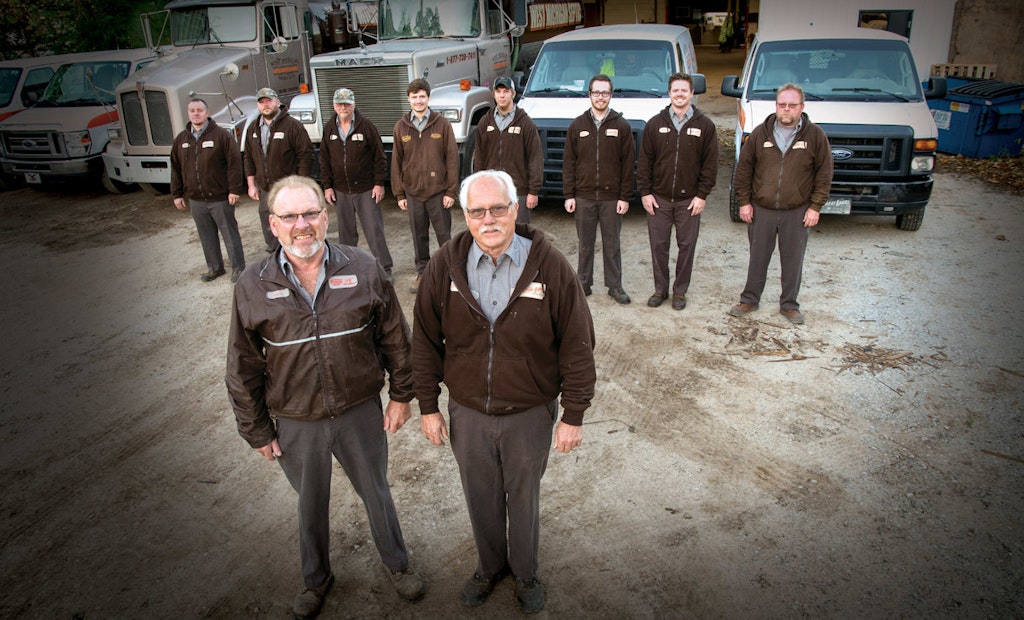
Owners Dave Snyder, left, and Terry Kiel are shown with the West Michigan Septic team, from left, Jacob Kiel, Joe Magner, Jon Stevens, Carl Krantz, Travis Barrette, Ryan George, T.J. Stariha and Ron Williams.
When 19-year-old Terry Kiel was presented with two job offers on the same day in 1976 — a foundry and a concrete plant — he never imagined his decision would lead to a career in the septic service industry. His brother encouraged him to learn a trade so he took the concrete job thinking he’d become a mason or block layer, but when he got there he discovered the job would be building, delivering and pumping septic tanks. It was a good company to work for so he stayed, but with no room for advancement he struck out on his own in 1987. “I built a septic truck and said, ‘Here I come, world.’”
A year later he added sewer and drain cleaning work and the company became West Michigan Septic Sewer & Drain Service. That’s when his friend Dave Snyder joined, first as a silent partner to help with financing, but soon as a full partner, stepping away from his vending machine job.
And in an amazing stroke of luck, when Kiel went to the unemployment office to hire a laborer to help with the sewer and drain work, he found someone from that industry who could teach him the trade and advise him on equipment. In the early 1990s he bought a backhoe and a dump truck and added repairs and installations.
Kiel and Snyder learned many lessons over the years. A couple of them were real game changers: 1. Being busy is not the same as being profitable. And 2. Despite concrete being the world Kiel grew up in and loved, he ultimately determined plastic tanks were better for his company.
Today, three names appear on the company’s building, vehicles and printed material. They made a couple acquisitions over the years — City Sewer & Drain Service and Heckman’s Contracting — and kept the names for legal and name recognition purposes. The combined company operates out of a 5,000-square-foot building on two acres of land in Muskegon, Michigan, a town of 37,000 on the eastern shore of Lake Michigan.
Snyder runs the office, doing scheduling, dispatching, invoicing and talking to customers, while Kiel is usually found on an excavation project along with Ron Williams and Travis Barrett. Kiel’s son Jacob and stepson T.J. Stariha do sewer and drain work, and 27-year company veteran Jon Stephens handles pumping. Joe Magner and Ryan George fill in where needed.
Kiel says it’s tough finding people, but they pay well and provide medical insurance, an IRA plan, paid vacations, short-term disability insurance, uniforms with weekly laundering and work shoes.
LOOKING GOOD
Kiel learned the importance of presenting a good image from his former employer. He built his first septic truck using a semi-tractor with a stretched frame not only because it could carry a 3,000-gallon tank (Presvac) and he thought it would last a long time, but because of its appearance. “It was a ‘pretty’ septic truck, if that makes sense,” he says. “I learned that from my employer — you’ve got to know what you’re doing and all that, but if you can look good, you’re in.”
When a banker advised him to write a business plan, he hired an expert to make sure it looked perfect. The banker was impressed and Kiel got his loan. He also chose to use an answering service rather than an answering machine, believing it appeared more professional and would prevent prospective customers from hanging up and calling someone else.
For marketing, he created a flyer with a lot of graphics, “So, no matter how you threw it away, the logo or the truck or my picture was going to show.” When the company started expanding the service territory, they obtained local phone numbers to make it easy for people to contact them. They maintain seven numbers.
The company carries 300 feet of hose on the vacuum truck so it can be parked on the road rather than on a customer’s property, avoiding the possibility of cracking a driveway or causing damage. It also gives them visibility, Kiel says, and is a subtle message to neighbors (potential customers) that you won’t destroy their yard.
All printed material has the company motto, “Honesty is still our policy,” because Kiel wants people to know it’s always been their policy. Sometimes it hurts to be honest, he says, but you’ve got to do it. Looking good also refers to professional conduct.
“You pull in with clean equipment and uniforms and you try your best to leave everything like you found it,” he says. “We have a soil conditioner on our skid-steer that grinds up the topsoil. We skim that off, pile it in a corner, put the septic system in, then put that topsoil back on. People are happy. It levels their yard off and it looks better than when we got there.”
BREAKING AWAY FROM CONCRETE
Until a few years ago, Kiel purchased concrete tanks from his former employer. It took a lot of persuasion to convince him to switch to plastic, but a salesman finally talked him into trying an Infiltrator Water Technologies unit with an EZflow drainfield.
“He gave me a free one and we gave it to a customer, just charging for the labor,” he says. “I gave a 12-year warranty and the manufacturer said he’d stand behind it.” Kiel was quickly sold.
“The technology has come so far that it’s now a better product,” he admits. “The tank is watertight, the drainfield is cleaner. You learn that stone is not drainage, it’s storage until the water can drain into the soil. The EZFlow is clean and neat. And it’s made of recycled products.”
Another advantage was the light weight of the tanks, enabling the company to sell their large excavation equipment. “We got rid of all that big heavy iron,” Kiel says. “We can set these tanks with a mini excavator.” Current equipment includes a Takeuchi TB235 compact excavator, Case 590 and John Deere 310 backhoes, Takeuchi skid-steer and a 12-yard 2005 Mack dump truck.
Kiel says stone and pipe is cheaper but takes more time and labor to install so cost-wise it’s about the same. The company provides a 12-year warranty on new units with the stipulation it’s the one to maintain it.
The company now uses Infiltrator and EZflow on all new installations. But concrete tanks still make up the bulk of their pumping and repair work. For risers on those tanks they use 18-inch culverts and cut them to length. And Kiel has his former employer make adapter rings for the older tanks with square covers. The company prefers to bury risers three inches below the surface for safety reasons. Waste is hauled to the Muskegon municipal plant, which Kiel says is one of the best in the world.
“People come from all over to check it out,” he says. “They’ve got hundreds of acres and made a system that is huge. And they take anything — grease, septic waste, light chemicals. Not many municipalities have that.”
REPAIR OR REPLACE
For sewer and drain cleaning work the company uses six Ford half-ton and three-quarter-ton Econolines, General Pipe Cleaners (a division of General Wire Spring) jetters in sizes up to six inches including a trailer-mounted unit, and pipe bursting equipment from HammerHead Trenchless Equipment. They have RIDGID cameras and locators and a Mighty Probe from T&T Tools.
On the pumping side, they have two vacuum trucks built by Marsh Industrial — a 1994 Kenworth tandem with a 2,500-gallon steel tank and a 1985 Mack tri-axle with a 3,300-gallon steel tank, both with National Vacuum Equipment pumps. They’re old, Kiel admits, but well maintained. Engines, transmissions and tanks are changed out on pumping and excavation equipment as needed.
“We’ve done everything to them,” Kiel says. “They make better stuff now, I’m not denying that. And they might get a little better mileage. But they’re more expensive to repair because it’s all high-technology stuff. So it costs you more to buy, more to repair, and it doesn’t make you any more money. You either have repair bills or you have truck payments. Which do you want?”
BUT ARE YOU MAKING MONEY
As he was flipping through Pumper one day in the early 1990s, Kiel saw something that really struck him.
“I read this article by Frank Blau,” he says. “What caught my eye was his question, ‘Are you a businessman or a business technician? You’re really good at your job, you just don’t know if you made any money or not.’” He contacted Blau who ran him through some numbers.
“He asked me how much I charged to clean a tank, and I told him. Then he asked me how much it cost me to clean a tank, and I said I don’t really know. ‘Then how do you know if you’re making any money?’ he asked. He told me everything I didn’t want to hear, but needed to hear.”
Thus began his business education. And even though Kiel and Snyder were living paycheck to paycheck at the time, they splurged and bought $350 worth of videotapes to learn everything they could about the business end of running a company.
Instead of basing their rates on what everybody else was charging, they learned to set prices so all expenses were covered, including nonproductive overhead, which is everything needed to run a business that doesn’t directly produce income. Blau also taught them to realize their value to society. “He said doctors, lawyers and dentists are prestigious jobs and everybody looks up to them, but when your septic tank doesn’t work you’re as important as they are.”
LOOSE ENDS
Kiel and Snyder are both 63 and starting to think about retirement. But before they step away there are a few things they need to take care of. First and foremost is getting the company onto better technology for managing projects, employees, customers, vehicles and equipment. Their current homegrown system is outdated and inadequate. Kiel says they may have a custom system built.
Looking back, Kiel says the partnership with Snyder has been great despite, or maybe because, they have a different outlook on things. But next on the agenda is succession planning. Kiel’s sons are interested in taking over the business but no definitive plans have been made. “We’re not there yet,” he says. “We still have some time. You get so busy doing stuff, but that’s our next job.”
Kiel’s accidental drift into septic work turned out to be a good thing, he says. “You just grow to love it. You’re on your own. You’re making something out of nothing. It’s the American dream — to own your own company.”
